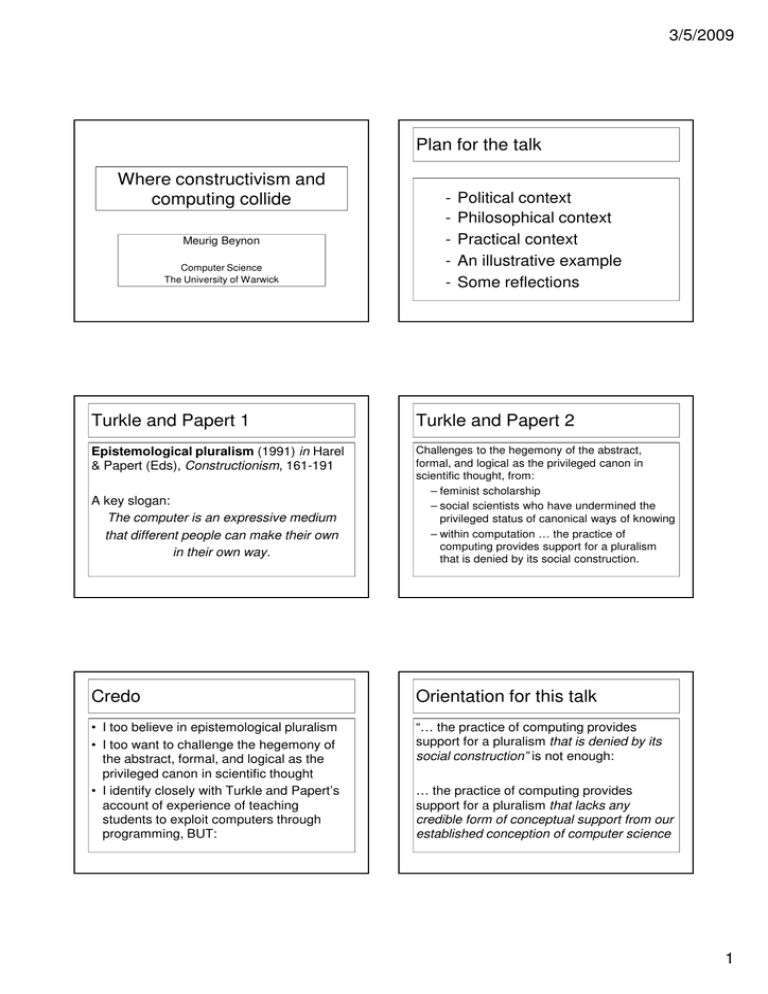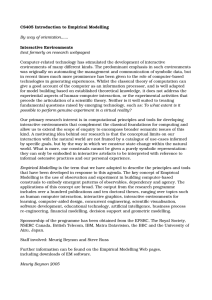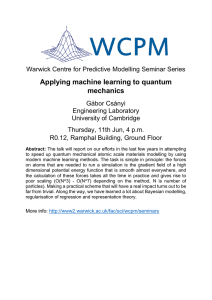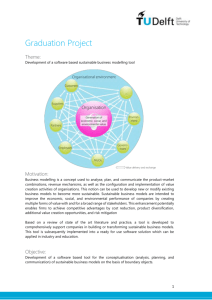Plan for the talk Where constructivism and computing collide
advertisement

3/5/2009 Plan for the talk Where constructivism and computing collide Meurig Beynon Computer Science The University of Warwick - Political context Philosophical context Practical context An illustrative example Some reflections Turkle and Papert 1 Turkle and Papert 2 Epistemological pluralism (1991) in Harel & Papert (Eds), Constructionism, 161-191 Challenges to the hegemony of the abstract, formal, and logical as the privileged canon in scientific thought, from: – feminist scholarship – social scientists who have undermined the privileged status of canonical ways of knowing – within computation … the practice of computing provides support for a pluralism that is denied by its social construction. A key slogan: The computer is an expressive medium that different people can make their own in their own way. Credo Orientation for this talk • I too believe in epistemological pluralism • I too want to challenge the hegemony of the abstract, formal, and logical as the privileged canon in scientific thought • I identify closely with Turkle and Papert’s account of experience of teaching students to exploit computers through programming, BUT: “… the practice of computing provides support for a pluralism that is denied by its social construction” is not enough: … the practice of computing provides support for a pluralism that lacks any credible form of conceptual support from our established conception of computer science 1 3/5/2009 Denied by social construction? … in so far as computer science is socially constructed, I entirely agree …but there has to be more to computer science than how it is socially constructed … supporting epistemological pluralism requires a science yet to be developed Where constructivism and computing collide Meurig Beynon The Empirical Modelling Research Group The University of Warwick Empirical Modelling? A useful analogy 1 Empirical Modelling is an alternative conceptual framework for computing It has involved the development of principles and tools over some 20 years It privileges modes of model-making with computers more primitive than programming It claims philosophical roots in the neglected Radical Empiricism of William James (1910) Computing technology has delivered superfast powerful vehicles to go on roads. It understands speed and power, appreciates driveability and ecology as less prestigious concerns … it aspires to flight. It’s very good at making new vehicles, but runs into problems making roads and making vehicles that go off road. A useful analogy 2 A useful analogy 3 Modern applications of computing target activities for which vehicles of any description are quite ill-suited, such as mountaineering, swimming or bird-watching. Empirical Modelling is to computer science as walking is to driving Empirical Modelling is to programming as dwelling is to travelling Empirical Modelling artefacts are to programs as binoculars, houses, cranes, bicycles are to cars 2 3/5/2009 More from Turkle and Papert … Lisa wants to manipulate computer language the way she works with words as she writes a poem. Alex … turns the Lego wheels on their sides to make flat "shoes" for his robot …he [uses] the motor to make … his robot (greatly stabilized by its flat "wheel shoes") vibrate and thus "travel." Metaphorically, matters arising in examples: - can you drive a car off road? - can you make your home in a car? - can you build roads as you drive? - can you birdwatch from a car? Perhaps a qualified yes to all these, but the primary obstacle is not to a matter of social construction, but of conceptual mismatch Primary obstacle? Proposal for computing 1 • would it work … ? • would it be rewarding to do … ? The principles and tools of computing should be conceived within an epistemological framework in which - the direct experience a computer affords can take precedence over abstractly defined functionality and meaning - any mode of interaction and interpretation of this experience is potentially open to consideration … of course, there’s nothing to stop you trying it, but I wouldn’t consider it rewarding to write poems in Java or program a robot to move by vibration Proposal for computing 2 Perhaps social constructivism may seem to provide such an epistemological framework If so, it has to confront the agenda set out by Latour in his paper: “The promises of constructivism” (see his five guarantees …) Latour’s five guarantees 1. Once in place, reality should not be allowed to be disputed … should be used as indisputable premise. 2. New claimants – which the former established order had not been able to take into account – to be heard 3. Common world to be composed progressively: not already there once and for all 4. Humans and non-humans engaged in a history that should render their separation impossible 5. Able to differentiate good and bad construction 3 3/5/2009 Proposal for computing 3 The practical context To be effective, such an epistemological framework should be helpful in addressing a central problem that has not so far been successfully addressed by the hard or the soft science of computing … Computing practice is fast developing … … from an Empirical Modelling perspective, it seems quite implausible that advances in conventional programming languages can have a radical effect on education … what is endorsed by EM thinking is the role of dependency: cf. spreadsheets – as set out by Baker and Sugden in 2003 … making sense of general software development as a constructivist activity Chris Olley, Guardian Link article The best maths software, in the hands of good teachers, is capable of overturning all the old "I hate maths" prejudices. It does this not just with attractive, animated presentation, but by showing some killer features. It will show movement - so an angle, for example, is revealed as a measure of rotation. It will help personalisation by being tailored to individual needs and abilities … perhaps most importantly, it'll be responsive to creative thinking: a child can change a number, or move a line, to see what the effect is on everything else … would like teachers to be seeking … "dynamic" software “that does mathematical things in an open-ended way, promoting mathematical conversations”. Dependency alone isn’t enough • have studied Imagine-Logo + dependency • need more than this: a methodology for modelling / programming with dependency • need a new conception to fully support – “tailored to individual needs and abilities” – “supporting mathematical conversations” programming for requirements problematic Radical Empiricism (RE) How RE regards knowledge • “a philosophic attitude” William James (1910) • RE has suffered criticism and neglect • RE invokes the word 'experience' to refer exclusively to what is given moment-bymoment in the perception of a person • what is given in experience is more than discrete sensory elements – it encompasses relationships of a conjunctive nature • RE sets out to relate all knowledge and understanding to its origin in personal experience • contends that all knowledge is ultimately rooted in the perception of conjunctive relations • puts the primary focus on personal, private and subjective activities 4 3/5/2009 Empirical Modelling (EM) Underlying principle of EM Body of principles, tools and models developed at the University of Warwick over 15-20 years, primarily through graduate theses and undergraduate projects The modeller fashions a “conjunctive For more background, see http://www.dcs.warwick.ac.uk/modelling and posters on educational themes at called the modeller’s construal) and a relation” between experience of interacting with a computer-based artefact (to be complementary experience to which the artefact refers (to be called its referent) http://empublic/projects/beynonKaleidoscope2005 Model making as construing Practice of EM • artefact is developed as a family of definitions – a definitive script – whose variables are the counterparts of observables in the referent • model-building is incremental, creative, iterative and experimental in character “modelling with definitive scripts” John Dewey at the typewriter … The word which I have just written I momentarily focal; around it there shade off into vagueness my typewriter, the desk, the room, the building, the campus, the town, and so on. In my experience, and in such a way as to qualify even what is shiningly apparent, are ... John Dewey with PowerPoint … • all the physical features of the environment extending out into space no one can say how far • all the habits and interests extending backward and forward in time, of the organism which – uses the typewriter – notes the written form of the word only as a temporary focus in a vast and changing scene 5 3/5/2009 David Gooding Experiment & the Making of Meaning "Construals are a means of interpreting unfamiliar experience and communicating one's trial interpretations. Construals are practical, situational and often concrete. They belong to the pre-verbal context of ostensive practices." A practical case study in Empirical Modelling … "... a construal cannot be grasped independently of the exploratory behaviour that produces it or the ostensive practices whereby an observer tries to convey it." Some reflections 1 Some reflections 2 Constructivism in the EM model • what is the model (presentation included?) • meaning constructed on-the-fly in interaction • meaning of sorted as social construction • suitable for “mathematical conversation” • blending of the teacher, learner, developer activities cf. constructivist learning • possibility of modelling misconceptions etc • future work: improving the interface • what would Sherry Turkle’s students have made of this environment? • what is bubblesort? issue • essential role of the physical artefact Conclusion There is a vital need for a constructivist account of computing … … EM as shedding light on what is socially constructed in relation to computing … EM as “constructivist computing”? … and where Latour’s critique of social constructivism applied to computing has force 6


